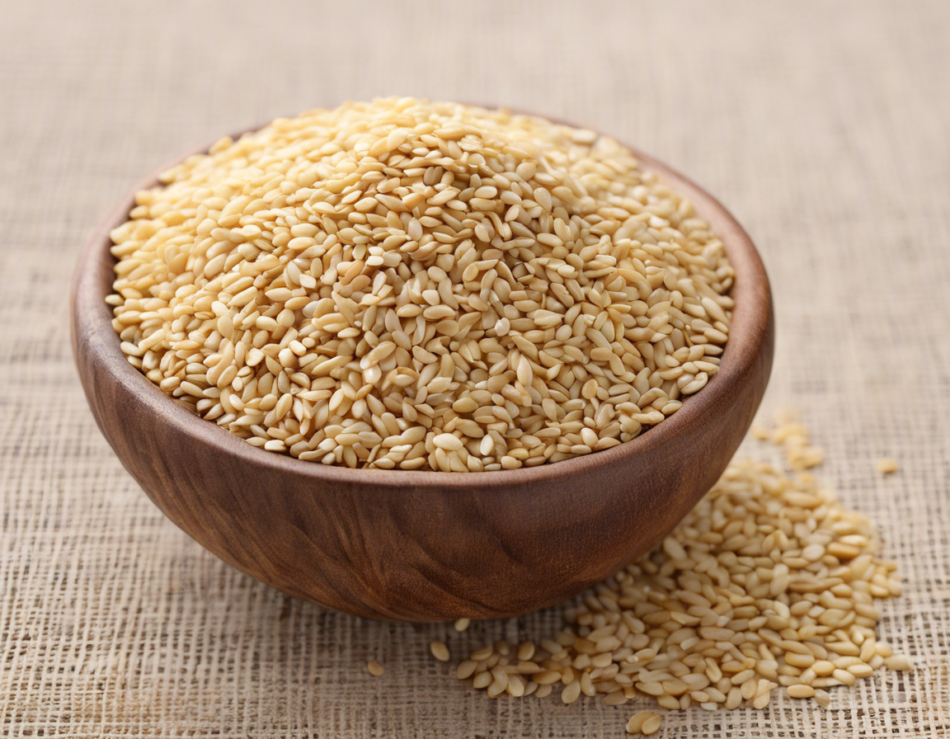Sesame seeds, known as ‘तिल’ in Hindi, are more than just a popular topping on burger buns or bagels. These tiny seeds have been cultivated for thousands of years and hold a special place in many cuisines and traditional medicine practices around the world. In this comprehensive guide, we will explore the various types of sesame seeds, their nutritional benefits, culinary uses, as well as their potential health benefits.
Types of Sesame Seeds:
White Sesame Seeds (सफेद तिल):
- White sesame seeds are the most common variety and are widely used in Indian cooking.
- They have a nutty flavor when toasted and are often sprinkled on top of dishes for added crunch.
Black Sesame Seeds (काले तिल):
- Black sesame seeds are more flavorful and slightly bitter compared to white sesame seeds.
- They are often used in sweets, desserts, and bakery items in Indian cuisine.
Brown Sesame Seeds (भूरे तिल):
- Brown sesame seeds are the unhulled version of white sesame seeds and are more nutritious.
- They have a slightly stronger flavor and are often used in health food products.
Nutritional Benefits of Sesame Seeds (तिल के फायदे):
Sesame seeds are nutritional powerhouses packed with essential vitamins, minerals, and antioxidants. Here are some of the key nutritional benefits of consuming sesame seeds regularly:
-
Rich in Healthy Fats: Sesame seeds are a great source of healthy fats, including omega-6 fatty acids, which are essential for heart health.
-
High in Protein: Sesame seeds are rich in protein, making them a valuable addition to vegetarian and vegan diets.
-
Packed with Minerals: Sesame seeds are a good source of calcium, iron, magnesium, and zinc, which are essential for bone health and immune function.
-
Antioxidant Properties: Sesame seeds contain antioxidants like lignans and vitamin E, which help protect cells from damage caused by free radicals.
-
Fiber Content: Sesame seeds are a good source of dietary fiber, which supports digestion and helps keep you feeling full.
Culinary Uses of Sesame Seeds (तिल का उपयोग):
Sesame seeds are a versatile ingredient that can be used in a variety of ways in cooking. Here are some popular culinary uses of sesame seeds:
-
Topping: Sprinkle sesame seeds on salads, stir-fries, sushi, or avocado toast for added flavor and texture.
-
Sesame Oil: Use sesame oil for stir-frying, dressing salads, or drizzling over cooked dishes for a rich nutty flavor.
-
Tahini: Tahini, a paste made from ground sesame seeds, is a key ingredient in Middle Eastern dishes like hummus and baba ghanoush.
-
Sesame Snaps: Roast sesame seeds with honey or jaggery to make delicious and nutritious sesame snaps.
-
Sesame Brittle: Combine sesame seeds with caramelized sugar to make crunchy sesame brittle, a popular sweet treat.
Health Benefits of Sesame Seeds (तिल के स्वास्थ्य लाभ):
In addition to their nutritional value, sesame seeds offer various health benefits when consumed as part of a balanced diet. Some of the potential health benefits of sesame seeds include:
-
Heart Health: The high content of monounsaturated fats in sesame seeds may help lower bad cholesterol levels and reduce the risk of heart disease.
-
Bone Health: Sesame seeds are rich in calcium, zinc, and other minerals that support bone health and may help prevent osteoporosis.
-
Blood Sugar Control: The fiber and protein in sesame seeds can help regulate blood sugar levels and may be beneficial for individuals with diabetes.
-
Anti-Inflammatory Properties: Sesame seeds contain compounds that have anti-inflammatory effects, which may help reduce inflammation in the body.
Frequently Asked Questions (FAQs) about Sesame Seeds:
1. Are sesame seeds good for weight loss?
- Yes, sesame seeds are a nutrient-dense food that can support weight loss when consumed in moderation as part of a balanced diet.
2. Can sesame seeds be eaten raw?
- While sesame seeds are safe to eat raw, toasting them can enhance their flavor and make them more fragrant.
3. Are sesame seeds gluten-free?
- Yes, sesame seeds are naturally gluten-free and can be safely consumed by individuals with gluten intolerance or celiac disease.
4. How can sesame seeds be stored to maintain freshness?
- To keep sesame seeds fresh, store them in an airtight container in a cool, dry place away from sunlight. Refrigeration can help extend their shelf life.
5. Can sesame seeds cause allergies?
- Sesame seed allergies are becoming more common. Individuals with a sesame allergy should avoid consuming sesame seeds and products containing sesame.
In conclusion, sesame seeds are a nutritious and versatile ingredient that can add flavor, texture, and health benefits to a wide range of dishes. Whether you sprinkle them on salads, blend them into sauces, or use them in baking, incorporating sesame seeds into your diet can be a delicious way to boost your overall health and well-being. Experiment with different types of sesame seeds and recipes to discover the unique flavors and benefits they have to offer.
